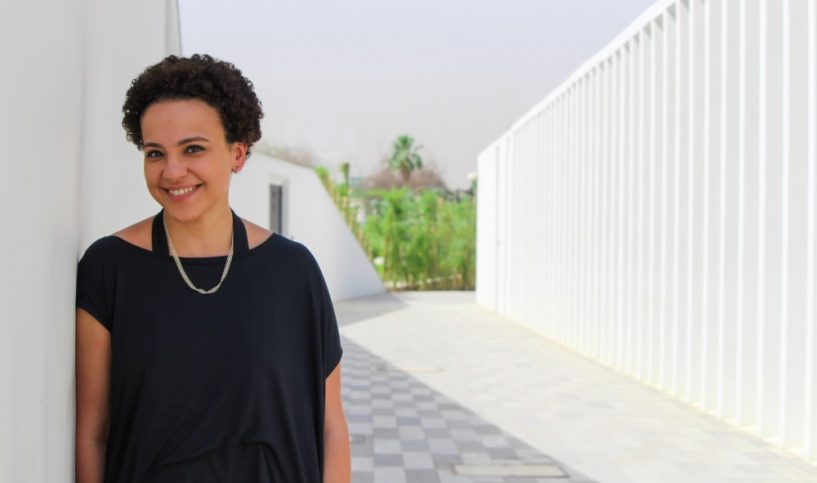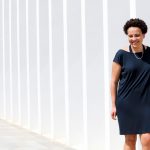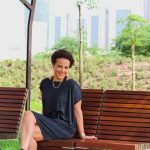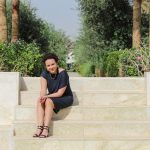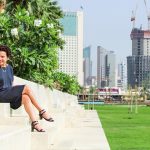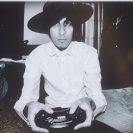For Farah Al-Nakib, being a historian means more than just hiding in the archives and writing books (though she loves that part!). It is also about making sense of the world around her, sharing her ideas with others, and engaging with interesting community projects around Kuwait. That is what life as a cultural historian is all about!
While many people might think of history as a boring, forgotten school subject, Farah always thought otherwise. Her passion for history goes back to her high school days here at The American School of Kuwait. Though initially majoring in journalism at the George Washington University, the college credits she earned from taking advanced placement history classes in high school led her to declare a second major in the subject that she was most interested in.
In her senior year at university, Farah wrote an honor’s thesis about Kuwait that allowed her to carry out archival research for the first time. She said, “It was the first time I ever studied Kuwait’s history. We never learned anything about our past at school, and being able to unearth unused documents about the subject I was researching was really thrilling.” She began working on her thesis a year after the late Amir His Highness Sheikh Jaber Al-Ahmed Al-Jaber Al-Sabah issued a decree in May of 1999 granting women the right to vote, which the new Parliament then voted against. With everyone in Kuwait discussing the constitutionality of the suffrage decree, Farah decided to delve into the origins of the country’s constitution as a way of historicizing the heated debate. After doing some digging, Farah found a contact who gave her access to the Kuwaiti Constituent Assembly’s meeting minutes from 1961. “The next thing I knew, my doorbell was ringing and this man was delivering these boxes of documents to me. I’m still not entirely sure how I got them!” For a budding historian, it was like uncovering a treasure. The thrill of that moment, and of reading the transcripts from that historic period, triggered her lifelong passion. She told bazaar, “I didn’t quite know it back then, but that experience officially turned me into a historian.”
Fifteen years later, Farah has just finished writing her first book on Kuwait’s urban social history, which is being published by Stanford University Press and should be released in early 2016. Her research on Kuwait’s continuously changing urban, social and cultural landscapes began as her PhD. Every time she came back to Kuwait to conduct fieldwork, the many changes she kept witnessing in the country confounded her, and deepened her desire to make sense of these changes and better understand their consequences through her research. Although her main focus was on the dramatic transformations that Kuwait experienced between the pre-oil and oil periods, Farah also began writing more about the post-invasion period.
“In a way I was looking for answers to personal questions,” Farah explained. “When I came back to Kuwait to conduct fieldwork in 2007, I was shocked and really sad to see that old Salmiya, once a thriving cultural and economic hub in Kuwait and a landmark of my own childhood, was being demolished to make way for more and more indoor malls.” It was at this point that Farah realized that her research into Kuwait’s past could be more than just an academic project. Because of the nature of her writing on urban and social issues, Farah’s work retains everyday public relevance. “I write about the urban landscape, everyday life, and social relations in Kuwait, topics that anyone who lives here can relate to. I want people to think about, and engage, and even challenge the arguments that I make in my work, because doing so will make people think more critically about Kuwait and our changing social conditions. Since I moved back five years ago, whenever I have given public talks I always try to make my content relatable to diverse audiences.” For example, in her work Farah emphasizes the importance of public spaces where people of different social and cultural backgrounds come into regular contact and interaction with each other, which hardly exist in Kuwait anymore. She illustrates her argument with the fatal stabbing that occurred at The Avenues in 2013. “I link the tragic event to the deterioration of urban life in Kuwait due to the lack of public spaces and the impact on our everyday social behaviors and interactions. Trying to make people see these realities in a relatable light raises awareness about issues that are inherent in all of our lives here, whether or not we are conscious of them.” We undoubtedly underestimate the role of the built environment in our everyday lives, and how the urban landscape shapes society (and vice versa). Farah tries to make sense of these questions in her upcoming book, making this project both a personal and a scholarly investigation of Kuwait’s past.
When Farah first told people in Kuwait what she was studying, they usually responded with, “What can a historian do in Kuwait?” or “Kuwait doesn’t have history!” But over the years between her first job out of college as a tour guide at the Dickson House Cultural Center to her current teaching position at the American University of Kuwait, Farah has noticed a growing local demand to learn more about Kuwait’s past. “To me,” she adds, “The thrill of history is more than just what I get out of my academic career. It is the constant process of learning unexpected things, uncovering old photos, hearing personal stories, and meeting such interesting people along the way!”
Now that Farah’s book is wrapping up, and after publishing several academic articles on themes related to the book, Farah has started to focus more on present-day urban and social developments in Kuwait. Specifically, she has been thinking about how new (largely youth-based) initiatives like Madeenah, the Secret Garden, Equait, MantaqaMe, among many others, represent a pivotal moment of change for Kuwait. She leaves us with this pensive thought, “What’s the point in writing about our country’s urban history, if I don’t also document the work of these groups that are slowly changing how people in Kuwait today relate both to their built environment and to each other. Citizen urbanism has never really existed in Kuwait, and if these new bottom-up initiatives can feed into policy-making they can have a significant impact on our everyday lives. It’s a very active time in Kuwait, and what we are witnessing, in a way, is a very positive response and reaction to political stagnation.”
Look out for this amazing historian’s future writings in our upcoming issues of bazaar. Until then, we hung out with Farah a bit more, picking her brain with our up close and personal questionnaire.
What do you most value in your friends?
Their ability to make me laugh until I cry. If you can laugh together until it hurts, you know that’s a valuable friendship.
What is your idea of perfect happiness?
When my family is gathered all together, surrounded by great food.
What is your greatest fear?
Losing the people I love.
What is the trait you most deplore in yourself?
I can lose my temper easily, especially when I’m tired or stressed.
What is the trait you most deplore in others?
Prejudice or intolerance in any form.
Which living person do you most admire?
My father. He has an incredible work ethic, and is the most honest and generous person I know.
What is your greatest extravagance?
Probably traveling. I tend to leave the country every chance I get, and while I do have an adventurous side I mostly like to go to the same few cities that I know and love most. But it’s not always purely for fun; most of the time I travel to write or do research (really!).
Which words or phrases do you most overuse?
“It’s on the syllabus.” My sisters and I are all university professors and we recently discussed how often we use this phrase with our students. Almost every student question I get asked through the course of my normal workweek can be answered with those four words!
What is it that you most dislike?
People who are unkind or unfair to others.
Which talent would you most like to have?
My sisters’ exceptional organization skills. I’m pretty organized by most normal standards, but they take things to a whole other level that, I must admit, I truly envy!
If you could have any job, what would it be?
Anything related to food. Despite everything we just talked about, cooking is my real passion and I secretly wish I could go back in time and pursue a career in food rather than academics!
What do you consider your greatest achievement?
I just finished my book manuscript on Kuwait’s urban social history, which I’ve been working on for nearly ten years (first as my doctoral dissertation).That is definitely my proudest achievement!
What is your most treasured possession?
My fireproof box of journals, which document my thoughts and life experiences since I started keeping one at the age of 11. There is nothing more valuable than being able to get back inside your own head at different ages and stages of life.
What is your most marked characteristic?
Physically, my short curly hair, which I am finally growing out (and struggling) after eight years! Personality-wise, I’m not sure. I think you’d need to ask the people around me!
Where would you most like to live?
California. I spent a substantial portion of my childhood there and I am ready to move back!
What are your favorite words to live by?
Quite simply, be kind to people: the people you love as well as strangers. Human kindness is so easy to give, yet is so lacking in our everyday lives.
Photography by Patrick Semaan.

